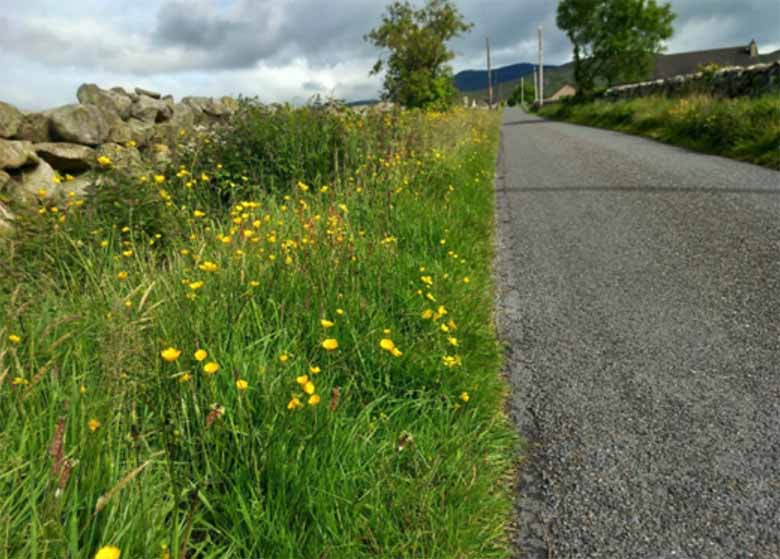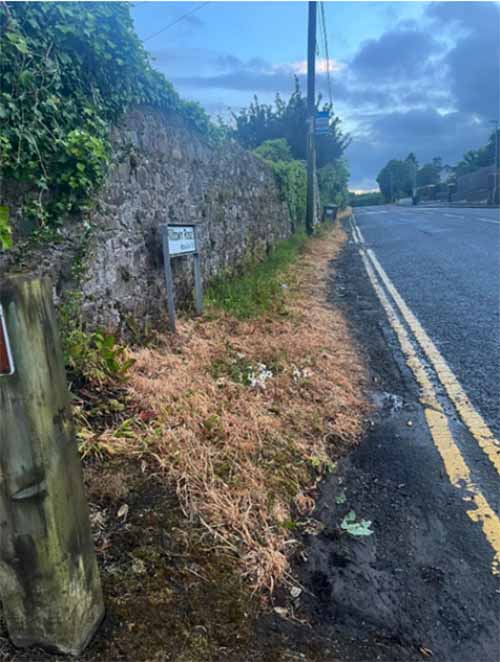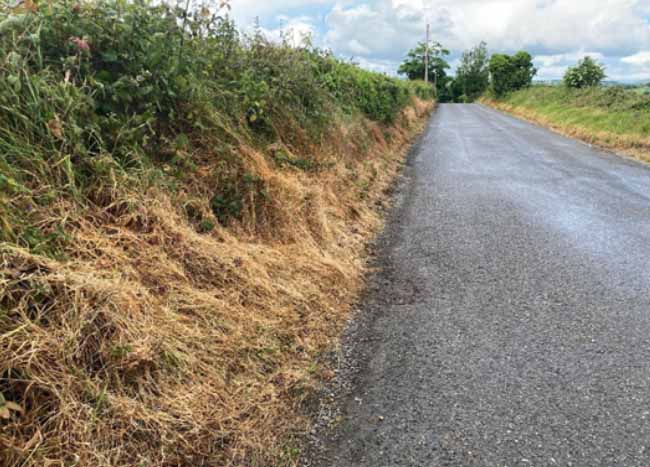DfI Is Challenged Over The Use Of Weedkiller On South Down Verges
There has been a strong reaction to the use of weedkillers in verges in South Down. Alliance MLA Andrew McMurray, the party’s Westminster candidate and also from the environmental Dolmens Group based in Newcastle have questioned why the Department of Infrastucture is using weekkiller spays.

McMurray raises questions about weed killer usage on South Down verges
South Down Alliance MLA, Andrew McMurray has raised questions with the Department of Infrastructure on their use of weedkiller spray on verges within the South Down area.
He said: “Over the weekend several constituents have raised concerns regarding the issue of verges being scarred brown.
“The working assumption is that this is as a result of the Department of Infrastructure using weedkiller to keep growth down on the verges of our roadsides.

“The extent of roadside that has been treated this way is very extensive and to a much greater extent than has ever been seen in recent years. Indeed, some areas which had been cultivated as areas of wildflowers have effectively been destroyed.
“The concern is that some of the weedkiller products are based on a particular chemical which has serious ecological and biodiversity impacts.
“Pollinators are incredibly important to the natural cycle and the use of certain weedkillers can lead to their declining numbers.
“There is also the concern that these chemicals then run into the watercourses through the drains and gullies which in turn has a knock-on effect on the aquatic life in these habitats.
“At this stage, I want to establish what has been used and to what extent it has been used.
“The Department for Infrastructure has in the recent past supported the All-Ireland Pollinator Plan.
“Part of this support was a commitment to exploring the use of alternatives to pesticides on the road networks.
“The Department of Infrastructure has in the past taken positive actions, such as ‘No Mow May’ to help aid biodiversity – and this is to be commended. If, as it seems likely, that herbicides have been used in this manner in such an excessive way, then this is regrettable and should be questioned.”
Dolmen Group Concerned At Use Of Weedkillers on Road Verges
- A Silent Spring – From No Mow May to No Buzz June:
Indiscriminate Herbicide Use On Road Verges Threatens Wildlife Says Dolmen Group
A Dolmens Group spokesperson said “Local people cannot have failed to note the extensive herbicide spraying on road verges across Newcastle, Castlewellan, and Dundrum.
“It has turned lush green verges into yellow dead zones along our most scenic roads, raising significant concerns about its detrimental environmental impact.

“The indiscriminate use of herbicides has resulted in the devastating destruction of numerous wildflower verges that had been a hive of activity for pollinators, insects, and biodiversity more broadly.
“Roads that have been sprayed with herbicides now appear scorched, burnt, and monochrome include, but are not limited to: Ardilea Road, Bryansford Road, Ballylough Road, Church Road, Dromara Road, Hilltown Road, Welcome to Newcastle Roundabout, and Wateresk Road, as well as many other roads across the district too numerous to report.
“The management and upkeep of roadside verges across Northern Ireland is the responsibility of the Department for Infrastructure (DfI). The adherence by the DfI to No Mow May this year has been undermined by what seems to be actions resulting in Wipeout June.
“Both Newry Mourne, and Down District Council and the DfI are members of the All-Ireland Pollinator Plan (AIPP). The AIPP framework brings together different sectors across the island of Ireland to create a landscape where pollinators can survive and thrive.
“The uncontrolled herbicide use by the DfI directly contravenes their membership in the AIPP and applies further pressure on the already deeply threatened native bee populations.”
The Dolmen Group added that South Down Alliance MLA Andrew McMurray has agreed to bring this issue up at the Assembly, where he will be highlighting the community’s concerns and the DfI’s contradictions to the All-Ireland Pollinator Plan.
The Dolmens Climate Action Network, a local community of people seeking action to address the climate and the nature emergencies, is calling for immediate attention and action from local councillors and the DfI.
Members want an explanation for the extensive use of herbicides and to prevent future destructive use of herbicides.

They explained that they want every public body to encourage integrated pollinator-friendly management of road verges, and enact a program for re-establishing wildlife along road verges to restore the beauty in and around the Mournes.
Dolmens’ members, including Sally Montgomery were bewildered and distraught at the destruction. She said: “It feels like going back in time.
“I thought we were long past the time when we sprayed any poison in public. Not only are these chemicals hazardous to human health, the herbicides risk getting into waterways and into the food chain.
“It looks terrible, and worst of all it is destroying habitat, the very thing that other parts of Government are fighting to protect and enhance. It really feels like the right hand doesn’t know what the left hand is doing”.
Another Dolmens Group member, Declan Owens, founder of Ecojustice Ireland, an environmental non-profit organisation based in Dundrum, said: “We are in a biodiversity crisis in this country and this practice is a form of ecocide.
“We need a consciousness shift within society regarding our relationship with nature to help to regenerate our precious natural resources.
“Therefore, eradicating this poisonous practice by the DfI will certainly aid this process and help to restore our reverence of nature.”
If you would like to learn more about how you can turn your garden into a pollinator-friendly garden you can check out the All-Ireland Pollinator Plan website for ‘quick wins’: https://pollinators.ie/.
More information on the Dolmens Climate Action Network can found on Facebook.
























